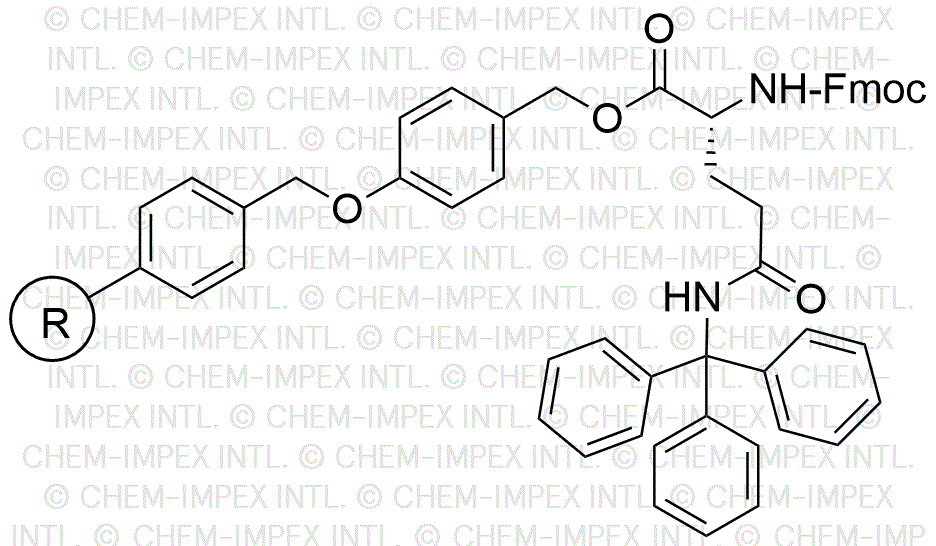Na-Fmoc- Nd-trityl-D-glutamine 4-alkoxybenzyl alcohol resin is widely utilized in research focused on:
- Peptide Synthesis: This resin serves as a solid support in the synthesis of peptides, allowing for efficient coupling and deprotection steps, which is crucial in developing new pharmaceuticals.
- Drug Development: Researchers use this resin to create peptide-based drugs, benefiting from its stability and ease of handling during the synthesis process.
- Bioconjugation: The resin facilitates the attachment of peptides to other biomolecules, enhancing the development of targeted therapies in cancer treatment.
- Protein Engineering: It is employed in the modification of proteins, helping scientists create variants with improved properties for research and therapeutic applications.
- Custom Resin Production: This compound allows for the customization of resin properties, enabling researchers to tailor their experiments to specific needs, which is a significant advantage over standard resins.
Informations générales
Propriétés
Sécurité et réglementation
Applications
Na-Fmoc- Nd-trityl-D-glutamine 4-alkoxybenzyl alcohol resin is widely utilized in research focused on:
- Peptide Synthesis: This resin serves as a solid support in the synthesis of peptides, allowing for efficient coupling and deprotection steps, which is crucial in developing new pharmaceuticals.
- Drug Development: Researchers use this resin to create peptide-based drugs, benefiting from its stability and ease of handling during the synthesis process.
- Bioconjugation: The resin facilitates the attachment of peptides to other biomolecules, enhancing the development of targeted therapies in cancer treatment.
- Protein Engineering: It is employed in the modification of proteins, helping scientists create variants with improved properties for research and therapeutic applications.
- Custom Resin Production: This compound allows for the customization of resin properties, enabling researchers to tailor their experiments to specific needs, which is a significant advantage over standard resins.
Documents
Fiches de données de sécurité (FDS)
La FDS fournit des informations de sécurité complètes sur la manipulation, le stockage et l’élimination du produit.
Spécifications du produit (PS)
Le PS fournit une description complète des propriétés du produit, notamment sa composition chimique, son état physique, sa pureté et les exigences de stockage. Il détaille également les plages de qualité acceptables et les applications prévues du produit.
Certificats d'analyse (COA)
Recherchez des certificats d'analyse (COA) en saisissant le numéro de lot du produit. Les numéros de lot et de lot se trouvent sur l'étiquette d'un produit, après les mots « Lot » ou « Lot de fabrication ».
Numéro de catalogue
Numéro de lot/série
Certificats d'origine (COO)
Ce certificat d'exploitation confirme le pays dans lequel le produit a été fabriqué, et détaille également les matériaux et composants utilisés et s'il est issu de sources naturelles, synthétiques ou autres sources spécifiques. Ce certificat peut être requis pour les douanes, le commerce et la conformité réglementaire.
Numéro de catalogue
Numéro de lot/série
Fiches de données de sécurité (FDS)
La FDS fournit des informations de sécurité complètes sur la manipulation, le stockage et l’élimination du produit.
DownloadSpécifications du produit (PS)
Le PS fournit une description complète des propriétés du produit, notamment sa composition chimique, son état physique, sa pureté et les exigences de stockage. Il détaille également les plages de qualité acceptables et les applications prévues du produit.
DownloadCertificats d'analyse (COA)
Recherchez des certificats d'analyse (COA) en saisissant le numéro de lot du produit. Les numéros de lot et de lot se trouvent sur l'étiquette d'un produit, après les mots « Lot » ou « Lot de fabrication ».
Numéro de catalogue
Numéro de lot/série
Certificats d'origine (COO)
Ce certificat d'exploitation confirme le pays dans lequel le produit a été fabriqué, et détaille également les matériaux et composants utilisés et s'il est issu de sources naturelles, synthétiques ou autres sources spécifiques. Ce certificat peut être requis pour les douanes, le commerce et la conformité réglementaire.


